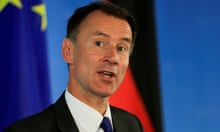Ed Miliband’s piece (The victims of the press need Leveson to be completed, 8 May) only serves to illustrate the flaws in the argument that a further inquiry into the press is justified. The Leveson inquiry and resulting police investigations into the press cost taxpayers nearly £50m. The true cost was probably much more. A major public consultation firmly rejected reopening the inquiry.
The Miliband/Clarke amendment to the data protection bill calls for an inquiry that goes much further than Leveson 2. It is broader, less defined in its scope and would catch all media organisations and their journalists – broadcast, print and online. It would take years to inquire and report, and cost the state millions of pounds. The amendment was inserted into the bill last Friday and there has been insufficient time to properly debate its implications, scope and cost.
As the Guardian said in its editorial on Leveson (2 March), it is now time to look forward, not behind. The criminal and civil wrongdoing in the press from the 1990s to 2011 has been thoroughly investigated. Most of those that alleged abuses by the press were called to give evidence at the inquiry and it made for difficult listening. Clearly things had gone wrong. But it is hard to see what further testimony can be given.
In the meantime, civil claims were made and many have been settled with significant compensation payments to victims. The News of the World was closed down. One of the biggest police investigations in British history led to the arrests of many journalists, extensive trials and convictions. Mr Miliband talks of this as “a narrow and unpublished police investigation”. One eight-month criminal trial and a number of other trials of journalists, fully reported and live tweeted for anyone interested, gave an open, public and full review of the evidence. The DPP and DoJ also reviewed all the evidence. To go over all this ground again because a few people did not like the results is unjustifiable.
The noisy advocates of a new inquiry are a small number of an anti-press lobby. It is clearly not supported by the wider public, and the enormous resource that would go to paying lawyers, a new judge and others will not lead to any new recommendations or information. Leveson’s report ran to 1,987 pages and over a million words. We don’t need another one.
The General Data Protection Regulation is coming into force. The role of the Information Commissioner’s Office in protecting data is strengthened by positive amendments in the bill. The ICO will issue guidance on seeking redress from the press, and a statutory review of media compliance with data law over the next four years is to be set up. These are the provisions that will provide proper protections in the future, not a pointless review of the past.
David Newell
CEO, News Media Association
Join the debate – email guardian.letters@theguardian.com










